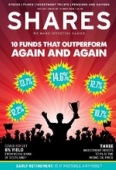Archived article
Please note that tax, investment, pension and ISA rules can change and the information and any views contained in this article may now be inaccurate.
Could you get 6% yield from Royal Bank of Scotland?

There is growing speculation that Royal Bank of Scotland (RBS) will soon pay its first dividend since 2008 and rejoin its UK-quoted banking peers as an income stock.
A $4.9bn settlement with the US Department of Justice (DoJ) over mis-selling mortgage-backed securities from 2005 to 2007 effectively signals the end of a nasty period of fines. The amount is also less than expected, prompting analysts to consider the potential for generous capital returns to shareholders.
RBS used to be a 3% to 4% yielding stock, as illustrated by the accompanying chart which shows its yield in the five years before the credit crunch.
Consensus forecasts published on Reuters show that analysts expect a 6.17p dividend in 2018, rising to 11.13p in 2019 and 17.99p in 2020. On the latter basis, the shares are currently trading on a 6.1% prospective yield.
We don’t believe that RBS will become a 6% yielding stock long-term; instead we believe the share price could trade higher by 2020 and so it would have a lower yield based on the market price in two years’ time, potentially at the 4% level.
Phil Hoffman, head of the UK, Middle East and Africa for Pzena Investments, invested in RBS before any resolution of the aforementioned misconduct issue was on the cards. His reasoning was that beyond the potentially large fine, fundamentally RBS was a good business.
He does warn that RBS has a ‘long way to go’; for instance, it’s still largely state owned with the Government having around a 71% stake in the bank. Chancellor Philip Hammond intends to sell a £3bn stake in the bank this financial year and further stake sales could weigh on the share price near-term.
Hoffman adds that RBS still has to put through a lot of restructuring which ‘needs to happen’. The bank is aiming to focus on its retail and commercial offering which will involve asset disposals as well as a cost reduction plan.
INSTITUTIONAL INTEREST
With RBS looking set to start paying dividends after a 10-year hiatus, equity income fund managers may now be interested in the stock.
For a bank that has clocked up almost £21bn in fines since 2011, the removal of the looming fine from the DoJ is a positive for investors. Indeed, its chief executive Ross McEwan says the move makes the investment case for the bank ‘much clearer’.
Important information:
These articles are provided by Shares magazine which is published by AJ Bell Media, a part of AJ Bell. Shares is not written by AJ Bell.
Shares is provided for your general information and use and is not a personal recommendation to invest. It is not intended to be relied upon by you in making or not making any investment decisions. The investments referred to in these articles will not be suitable for all investors. If in doubt please seek appropriate independent financial advice.
Investors acting on the information in these articles do so at their own risk and AJ Bell Media and its staff do not accept liability for losses suffered by investors as a result of their investment decisions.

 magazine
magazine











